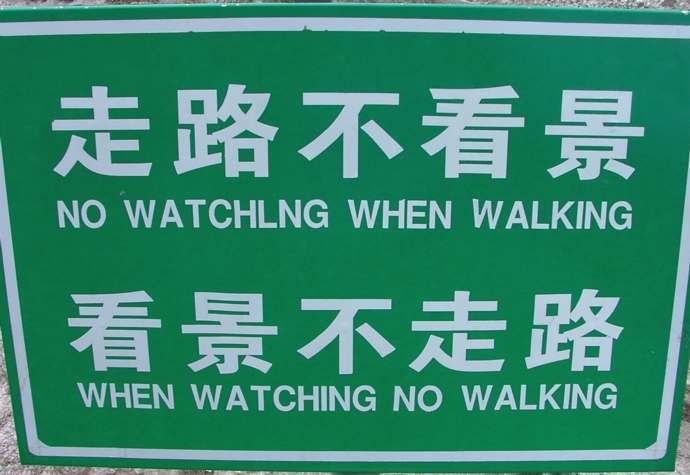No watching and no walking
« previous post | next post »
Bryan Van Norden sent in this sign that he found here:
zǒulù bù kàn jǐng
kàn jǐng bù zǒulù
走路不看景
看景不走路
"don't look at the scenery when you're walking
don't walk when you're looking at the scenery"
It's sort of like walking and chewing gum at the same time, except that if you walk while enjoying the scenery or enjoy the scenery while walking, you might fall off the mountain and die.

Ruth Blau said,
November 8, 2019 @ 6:42 am
"WATCHLNG"???
Elizabeth said,
November 8, 2019 @ 6:46 am
Reminds me of a slogan in Japanese used to discourage drunk driving:
飲むなら乗るな
乗るなら飲むな
Nomu nara noru na
Noru nara nomu na
"Don't drink if you drive.
Don't drive if you drink."
Rodger C said,
November 8, 2019 @ 7:39 am
"If you drink, don't drive. If you drive, don't drink." was a PSA slogan in the US many years ago.
Michael Watts said,
November 8, 2019 @ 9:34 am
I assume at some point in the process a capital I was reinterpreted as a lowercase L. That kind of error is fairly common in China.
I find this gloss very interesting in the context of https://languagelog.ldc.upenn.edu/nll/?p=44893 , where we learned that
Seems that if the Chinese are comfortable using 不 to issue negative commands on signs, it should be fair game for the Japanese to do the same thing in the Chinese translations on their signs. But I'd love to hear more about when this should or shouldn't occur.
rpsms said,
November 8, 2019 @ 1:33 pm
It's sort of like walking and chewing gum at the same time, except that if you walk while enjoying the scenery or enjoy the scenery while walking, you might fall off the mountain and die.
But can we walk and chew the scenery?
John Swindle said,
November 9, 2019 @ 1:45 am
@Michael Watts: Excellent point about Chinese 不 bù ("not"). I'm just a long-time slow learner, but I can't see using 不看景 ("not sightseeing") by itself to prohibit sightseeing or 不走路 ("not walking") by itself to prohibit walking, whereas 不 is just right in the sign on the mountain trail: A no B, B no A. Some kind of coordinating thing? I don't know what the rule is.
Compare also 没有共产党没有新中国 Méiyǒu gòngchǎndǎng méiyǒu xīn zhōngguó ("No Communist Party, no New China") and "Neither Mitt smokes nor Barack smokes."
Michael Watts said,
November 9, 2019 @ 5:12 am
I asked a friend about these two signs:
Jonathan Smith said,
November 9, 2019 @ 9:34 am
While it is true that "to tell someone not to do something," bie2 别 is normal spoken Mandarin, I don't think you will find this colloquial-feeling historical contraction too often in public signage, but rather wenyan wu4 勿 and words like 禁止, 严禁…
As for 不 in similar contexts, I'm not sure Michael Watts' friend has quite gotten to the heart of it… to me, signs like "不剩饭 不剩菜" "文明用餐 不吸烟 不大声喧哗" "走廊内不奔跑 不追逐不打闹" (and famous "不忘初心"?) seem to convey a familial "we don't / let's don't" as opposed to being commands sensu stricto.
John Swindle said,
November 9, 2019 @ 9:50 pm
Michael Watts, I see! So 不吃不喝 bù chī bù hē "neither eating nor drinking" is an idiom of sorts. That's what I missed in the other case. In line with what Jonathan Smith said, though, the sign on the trail isn't exactly a prohibition, and substituting one of the "don't" words would make it sound like a regulation.